In March 2017 the then Executive Secretary of the UNFCCC Patricia Espinosa Espinosa while speaking at the opening of the President of the General Assembly High Level Event Climate Change and Sustainable Development Agenda in New York noted that “the Sustainable Development and Climate Change are inherently linked by action we take looking at climate and sustainability holistically, we maximise the potential for outcome of every action we take and when international commitments are turned into country level actions, tangible benefits are delivered to communities and people who live there”.

The UN Secretary-General at the same event said: “There is a connection between Climate Change and Sustainable Development Agenda.” The implication of the two statements is that we must have an integrated approach to our challenges as the future of humanity depends on human factor if we want to successfully integrate these two to achieve the best for humanity.
The underlying factor is effectively managing the process to ensure the survival of humanity and the key to this is having well skilled, well trained and well focussed people who can drive the process. There is the need to create a good training platform and mechanism capability building, skill acquisition and development, knowledge and learning. Africa must face its challenges and address it by finding solutions that will be sustainable anchor on its own people.
The reality of climate change is right in our doorsteps as we are daily experiencing climatic changes and attendant consequences as evidenced with the herdsmen, Lake Chad, various social actions, among others.
We also have new terms in our vocabularies – Greenhouse Gas lnventories, Sustainability, Adaptation, Mitigation, and Sustainability Management System, among others. We must ensure that majority of our people understand these terms by creating awareness programmes, education, positive paradigm shift in our approach to environment bearing in mind that humans cause a lot in not ensuring environmental cleaningness, right cultural values and sustainability. These issues may look simple but the truth is that what is, is different from what ought to be .The time is now for all of us, citizens, government, business and non-governmental organisations to invest our resources, energy, time, money on learning and skill development to address the “monster” called climate change.
The opportunities in the climate change – shift to low carbon economy, carbon market, research, renewable energy, energy efficiency, waste-to-wealth – all require a learning process. The other side of the coin creates new jobs and businesses that can turn positively the fortunes of our nation, help in our diversification programmes and improve the livelihood of our people.
The world of work is challenging and the key to the future is investment in science, technology, creativity, innovation mathematics, knowledge and human capital development especially in gender and youths. These are the templates for driving economic prosperity with strong inclusion of greater number of our people as active participants in the economic, social, advocacy, political and environmental activities.
We envisage that there is an urgent need for real collaboration between the people and the public officers/enforcement agents. There should be very effective and adaptable training, remuneration and attitudinal change in this area. They should see themselves as partners in development, trainers, mediators, colleagues and friends of the citizens when using their enforcement and regulatory powers.
The world today is singing the songs of collaboration, sharing experience and partnership. We must all be active participants in our environment and world. We must be disciplined, responsible and caring to move forward and help in creating a knowledge-based society.
The steps being taking by Private Financing Network (PFAN), the African Development Bank and a group of finanacing organisations and development partners in championing development of human capital, bridging the skill and knowledge gaps in the building of adaptation experts, project developers, financial engineers, renewable energy engineers, bankers, investment analysts, and technicians, among others, are worthy of commendation. There is a huge knowledge gap that must be filled to enhance efficiency, growth and competitiveness. The opportunities are abound to train people in different fields for generation of employment .The various governments, banks, private organisations, foundations, wealthy individuals and others are enjoined to support this initiative and drive the process of developing competent and qualified people who will be good resource in the task on hand and the future.
PFAN working under the umbrella of the United Nations Industrial Development Organisation (UNIDO) in partnership with the Renewable Energy and Energy Efficiency (REEP) has also appointed coaches/consultants, organisations and individuals to provide expert advise, guidance and coaching to accepted projects to help to raise investment and financing.
They have also constituted a database of these pool of highly specialised group called PFAN Network as potential source of new climate change, clean energy, and sustainable investment projects. They have also provided access to information, knowledge, network, sharing experience, continuous training, facilitation and collaboration on a global basis. The import of this is access to resources that are global and ordinarily not accessible.
It is appropriate that governments in Africa including Nigeria must urgently fund, invest and support this effort, address the skill gaps and get qualified and competent organisations and personnel to train, advice and be available to help in the “train the trainers” programmes that can assist in addressing the challenges of climate change, strengthen Agenda 2030 and Sustainable Development Goals, the commitment on Paris Climate Agreement and others that can turn the tap to opportunities as this will help to conserve our scarce foreign exchange and develop a core of African experts with cross-disciplinary, critical and creative thinking, problem solution, technology, creativity and knowledge. The time is now, and all efforts must be made to act now and seek for appropriate assistance to weather through the storm.
By Prince Lekan Fadina
